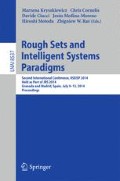Abstract
Decision-making could be defined as the process to choose a suitable decision among a set of possible alternatives in a given activity. It is a relevant subject in numerous disciplines such as engineering, psychology, risk analysis, operations research, etc. However, most real-life problems are unstructured in nature, often involving vagueness and uncertainty features. It makes difficult to apply exact models, being necessary to adopt approximate algorithms based on Artificial Intelligence and Soft Computing techniques. In this paper we present a novel decision-making model called Rough Cognitive Networks. It combines the capability of Rough Sets Theory for handling inconsistent patterns, with the modeling and simulation features of Fuzzy Cognitive Maps. Towards the end, we obtain an accurate hybrid model that allows to solve non-trivial continuous, discrete, or mixed-variable decision-making problems.
Access this chapter
Tax calculation will be finalised at checkout
Purchases are for personal use only
Preview
Unable to display preview. Download preview PDF.
References
Pawlak, Z.: Rough sets. Int. J. of Information and Computer Sciences 11, 341–356 (1982)
Bello, R., Verdegay, J.: Rough sets in the Soft Computing environment. Information Science 212, 1–14 (2012)
Pérez, R.B., Garcia, M.M.: Probabilistic approaches to the Rough Set Theory and their applications in decisionmaking. In: Espin, R., Pérez, R.B., Cobo, A., Marx, J., Valdés Olmos, R.A. (eds.) Soft Computing for Business Intelligence. SCI, vol. 537, pp. 67–80. Springer, Heidelberg (2014)
Yao, Y.: Three-way decisions with probabilistic rough sets. Information Science 180, 341–353 (2010)
Yao, Y.: Three-way decision: An interpretation of rules in rough set theory. In: Wen, P., Li, Y., Polkowski, L., Yao, Y., Tsumoto, S., Wang, G. (eds.) RSKT 2009. LNCS (LNAI), vol. 5589, pp. 642–649. Springer, Heidelberg (2009)
Wong, S., Ziarko, W.: Algorithm for inductive learning. Bulletin of the Polish Academy of Sciences Technical Sciences 34, 271–276 (1986)
Yao, Y.: The superiority of three-way decisions in probabilistic rough set models. Information Science 180, 1080–1096 (2011)
Kosko, B.: Fuzzy Cognitive Maps. Int. Journal of Man-Machine Studies 24, 65–75 (1986)
Kosko, B.: Hidden patterns in combined and adaptive knowledge networks. International Journal of Approximate Reasoning 2, 377–393 (1988)
Kosko, B.: Fuzzy Engineering. Prentice-Hall Inc., New York (1997)
Bueno, S., Salmeron, J.L.: Benchmarking main activation functions in Fuzzy cognitive maps. Expert Syst. Appl. 36, 5221–5229 (2009)
Tsadiras, A.K.: Comparing the inference capabilities of binary, trivalent and sigmoid fuzzy cognitive maps. Information Science 178, 3880–3894 (2008)
Slowinski, R., Vanderpooten, D.: A generalized definition of rough approximations based on similarity. IEEE Transactions on Data and Knowledge Engineering 12, 331–336 (2000)
Filiberto, Y., Bello, R., et al.: A method to build similarity relations into extended rough set theory. In: Proceedings of the 10th International Conference on Intelligent Systems Design and Applications, ISDA 2010, pp. 1314–1319. IEEE (2010)
Wilson, D.R., Martínez, T.R.: Improved heterogeneous distance functions. Journal of Artificial Intelligence Research 6, 1–34 (1997)
Miao, Y., Liu, Z.Q.: On causal inference in fuzzy cognitive maps. IEEE Transactions on Fuzzy Systems 8, 107–119 (2000)
León, M., Nápoles, G., García, M.M., Bello, R., Vanhoof, K.: Two Steps Individuals Travel Behavior Modeling through Fuzzy Cognitive Maps Pre-definition and Learning. In: Batyrshin, I., Sidorov, G. (eds.) MICAI 2011, Part II. LNCS (LNAI), vol. 7095, pp. 82–94. Springer, Heidelberg (2011)
León, M., Nápoles, G., Bello, R., Mkrtchyan, L., Depaire, B., Vanhoof, K.: Tackling Travel Behaviour: An approach based on Fuzzy Cognitive Maps. International Journal of Computational Intelligence Systems 6, 1012–1039 (2013)
Author information
Authors and Affiliations
Editor information
Editors and Affiliations
Rights and permissions
Copyright information
© 2014 Springer International Publishing Switzerland
About this paper
Cite this paper
Nápoles, G., Grau, I., Vanhoof, K., Bello, R. (2014). Hybrid Model Based on Rough Sets Theory and Fuzzy Cognitive Maps for Decision-Making. In: Kryszkiewicz, M., Cornelis, C., Ciucci, D., Medina-Moreno, J., Motoda, H., Raś, Z.W. (eds) Rough Sets and Intelligent Systems Paradigms. Lecture Notes in Computer Science(), vol 8537. Springer, Cham. https://doi.org/10.1007/978-3-319-08729-0_16
Download citation
DOI: https://doi.org/10.1007/978-3-319-08729-0_16
Publisher Name: Springer, Cham
Print ISBN: 978-3-319-08728-3
Online ISBN: 978-3-319-08729-0
eBook Packages: Computer ScienceComputer Science (R0)

